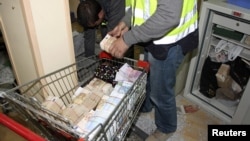“Money is the common denominator of every type of illicit activity, from terrorism to wildlife trafficking,” said David Luna of the Bureau for International Narcotics and Law Enforcement Affairs. If kleptocrats, criminal organizations, and terrorists cannot launder their money, they will have a harder time spending it, thereby decreasing their ability to finance their illicit activities.
According to the United Nations Office on Drugs and Crimes, or UNODC, kleptocrats and criminal entrepreneurs hide the proceeds of their crimes in offshore shell companies and foundations and then launder most of that through financial institutions into the global financial system. As a result, illicit financial flows, or dirty money, is flooding financial centers such a Dubai, London, New York City, Hong Kong, Sydney, and others.
According to a 2011 UNODC research report, an estimated $1.6 trillion dollars was laundered in the global financial system, of which an estimated $580 billion is related to drug trafficking and other transnational criminal activities.
“The world we live in,” said Mr. Luna, “is one in which legal business transactions and legitimate commerce both facilitate and feed off the illegal economy; one in which illegal arms brokers and narcotics kingpins are acting in practice as the new CEOs and venture capitalists. From Wall Street to other financial centers across the globe, illicit networks are infiltrating and corrupting licit markets.”
In the process, they are preventing fair and open markets from reaching their full economic potential, and, in the developing world, keeping communities from building the markets and investment frontiers of tomorrow.
The United States is committed to combating transnational crime, corruption, and money laundering. A key pillar of the strategy is to enhance international cooperation with partners to combat the nexus of organized crime, narco-trafficking, and terrorism.
The strategy also challenges the U.S. government and its international partners to work together to combat transnational criminal organizations and take that fight to the next level by breaking their corruptive power; attacking their financial underpinnings; denying entry to criminal actors; stripping them of their illicit wealth by imposing financial sanctions and severing their access to the financial system.
This strategy offers the best way to stop the flow of “dirty money”.
According to the United Nations Office on Drugs and Crimes, or UNODC, kleptocrats and criminal entrepreneurs hide the proceeds of their crimes in offshore shell companies and foundations and then launder most of that through financial institutions into the global financial system. As a result, illicit financial flows, or dirty money, is flooding financial centers such a Dubai, London, New York City, Hong Kong, Sydney, and others.
According to a 2011 UNODC research report, an estimated $1.6 trillion dollars was laundered in the global financial system, of which an estimated $580 billion is related to drug trafficking and other transnational criminal activities.
“The world we live in,” said Mr. Luna, “is one in which legal business transactions and legitimate commerce both facilitate and feed off the illegal economy; one in which illegal arms brokers and narcotics kingpins are acting in practice as the new CEOs and venture capitalists. From Wall Street to other financial centers across the globe, illicit networks are infiltrating and corrupting licit markets.”
In the process, they are preventing fair and open markets from reaching their full economic potential, and, in the developing world, keeping communities from building the markets and investment frontiers of tomorrow.
The United States is committed to combating transnational crime, corruption, and money laundering. A key pillar of the strategy is to enhance international cooperation with partners to combat the nexus of organized crime, narco-trafficking, and terrorism.
The strategy also challenges the U.S. government and its international partners to work together to combat transnational criminal organizations and take that fight to the next level by breaking their corruptive power; attacking their financial underpinnings; denying entry to criminal actors; stripping them of their illicit wealth by imposing financial sanctions and severing their access to the financial system.
This strategy offers the best way to stop the flow of “dirty money”.

















